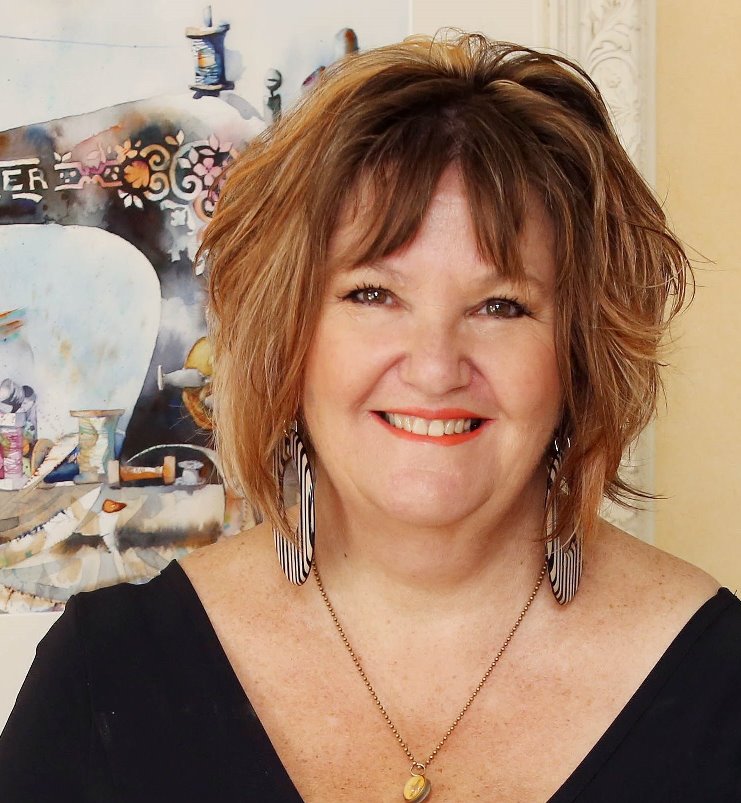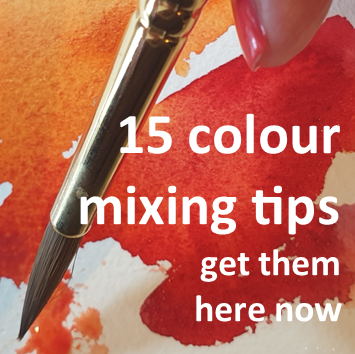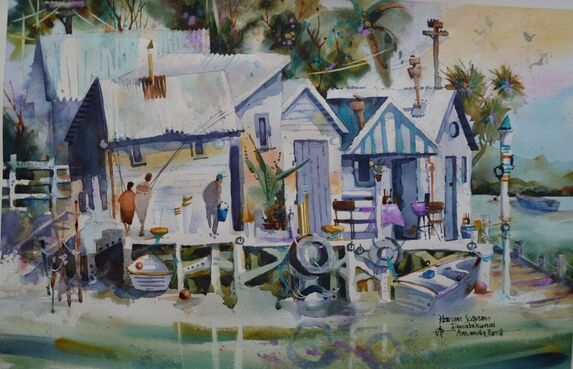 Harum Scarum, WNZ demo painting July 2021. 5th painting in my Pauatahanui series Harum Scarum, WNZ demo painting July 2021. 5th painting in my Pauatahanui series
My workshops on how to generate design ideas came about because a student said they were not ever able to get a “good” photograph of the scene.
I worked very hard on the design of “pauatahanui” and the ensuing series because it’s a popular scene to paint. So how could I make mine different? I got all excited and had to see these boat sheds for myself (aka ROAD TRIP!!). It took 6 months to create a design concept I was happy with. So the subject of this workshop became how to design a painting and not be reliant on good photos because good photos are rare and don't miraculously turn up when required! Somewhat akin to how to paint from a bad photo. Another thought, it doesn't take courage to paint what you see - it does take courage to paint what you think and feel. I often turn away from my reference, it was pointed out to me some years ago that I rarely “look” at my subject. Through my study and observation I begin a path of understanding. I take reference photos, I create thumbnail studies which lead me to my design idea - I want my work to be unique, I want the essence of the subject, I want it to be from me. So, how to be less reliant on photos? it's all about getting an idea. one thing I must say to you is that, generating ideas is not easy, like everything it takes consistent and frequent effort. My typical practice revolves around drawing/designing (en plein air or in my studio) a thumbnail and doodling some of the shapes I think I will want. What do I like or not like? Leave out, add in, bring something relevant in from another scene. This is where I get to know my subject and the relationships of the other elements to each other. I have sketched/painted many boat yard scenes so I feel confident about bringing ideas in from previous study. And that's what this is about - study and observation. Even though I have no intention of creating a photographic realism painting, I need to understand shapes, light and dark, perspective, values etc to create a work based on simplified shapes. what could i do that was different/better? Firstly, I have the power of watercolour's fluidity; secondly, a unique composition. So the idea became the jumble and chaos of boatsheds and the ensuing detritus. ciao Amanda
0 Comments
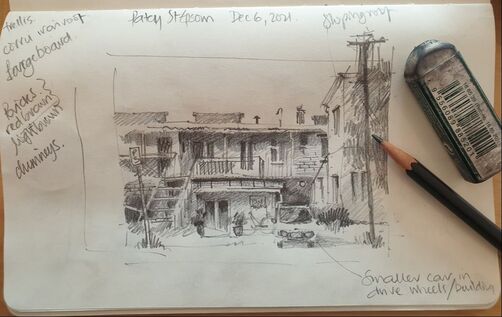 with my notes about why I wanted to paint it, mostly memory joggers with my notes about why I wanted to paint it, mostly memory joggers
Students often struggle to understand what their painting is about.
This understanding is key because it's all wrapped up in your story and what you want to say. It follows that students often feel they have little of import to say therefore this is irrelevant to them. Your story is important because it will help you design a work that you are passionate about and will help you to focus on the important elements that attracted you in the first place. Thereby helping you avoid over-stating support and background elements. What am I most interested in? your painting (story, poem, sculpture, composition, drawing etc) must have a purpose and, yes, the purpose can be learning but more than this – why paint it? What is it about? What drew you (pardon the pun) to want to paint it? Without your want, your passion to paint it, there’s no story, there’s no purpose. Might as well put your best foot forward and crack it! We’ve talked about this before, sometimes it comes down to making yourself want to paint “it”. Do your research, study your subject, create design thumbnails etc (this research and study also has another purpose for discussion later). Design your painting, what can you use to create a painting with strong design? So what made you want to paint this? Was it a fleeting light? Shapes interlocking and overlapping that piqued your interest? Unusual colours juxtaposed? A strong light/dark contrast? People involved in some interesting activity? An idea – what if I put this with that? Whatever it was that intrigued you is your story. It’s really only necessary to explain it to yourself, to keep you on track, write it down. So then your painting becomes a concept about how to tell this story and the visual language you’ll need to tell it. For example, let’s talk about a stiped canopy. I might want a strong light and use the stripes and shadows to help me describe the shape of the canopy. There’s probably a door or a window under the canopy, this could be used for a strong value contrast – lightest light against the darkest dark. There might be a group of people nearby, can you link them to the canopy/doorway? Is it a shop, they’re going to walk through the door? People walking out with shopping bags filled with goodies. My focus must stay on the canopy and elements that help me describe the scene and the story of the canopy, maybe it's blowing around in the wind. Exaggerate anything that leads to the focal area, minimise supporting gorgeousness. What's your why? ciao bei pittori xx 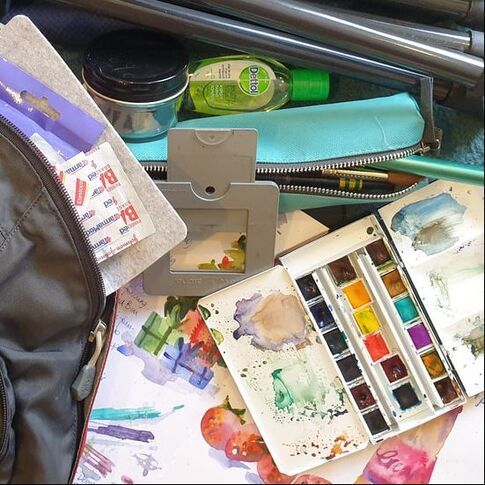
I'm still in my self-imposed "lockdown" with my continuing knee problem, It's a lot better but not better enough .. thwarted by my feeble attempts to "keep calm and carry on".
Something that’s really bugging me is my studio clear-out/tidy up/re-shuffle/reorganise started before Christmas. It was a good idea at the time but now I have 2 piles on the floor that are attempting to morph into 3 and I can’t get down there to do much about it. It’s making me crazy! PLUS while I’m nursing my poor wee ginocchio Dennis has now gone back to work, Amy’s back to work and there’s no-one here to entertain me!! YIKES!! So now I find myself in this temporary situation of cabin fever - I'm desperate to get out and paint/sketch, so I've made myself a new plan for my coming escapades. in a feeble attempt to get back to normal, i went for a walk with Amy and the dog. I trailed far behind them, it was so nice to be out and hearing the birds and children playing, families and their picnics but, I have to say, I paid for it the next day ... mamma mia!! It reminded me how dependent I am on my walking, it's my chief thinking time, my meditation and quiet time that allows my thoughts and ideas to run and play out. Another purpose for me is exploration, this is when I see things that inspire me, a fleeting light, shapes interlocking and overlapping, colours or some other interesting and diverting sights. To get out of the house, I've been for a few outings in the car (bicycle is a no-go atm) to scope out some sketching locations but of course, even here in Auckland it's almost impossible to park close enough. So I've decided to go to cafes again, they have to be in the right place, scenic and comfy. There are so many ways to enjoy sketching out, for me, its a totally absorbing experience. Although I love my little value thumbnail sketches, I learn a lot about a scene using this process, I feel the need to change things up a little, expand my sketching and bring more of it into my life. So!! I bought a new sketchbook and made a sketch kit that's always with me. My new sketchbook has a soft cover, so a little lighter than a hard cover but I found an old light but rigid clipboard. My backpack is pretty old, so old it doesn't have a smart phone size pocket - urk! It has a great "book" pocket but without an easy small pocket, pretty much everything falls to the bottom. In my bag I also have a wee first-aid kit, a small professional pan-set, tramper's collapsible water cup, pencil case and a few other weird sketch tools to fun things up a bit! In my pencil case, I have my standard soft pencils, a sharpener and eraser, tombow value brushpens, general’s sketching pencil, small view finder, calligraphy sketch pen, pastel and watercolour pencil, travel brush, small flat brush, water spritzer. To protect pencil tips and brush points, I always place them in the case in the same direction and then “up” in my bag. In Sketch class last week, Mary said “I can’t see enough detail, I’m too far away”. I agree, I need to see exactly what goes on, this helps me to build my story. Go for a walk to understand the lay of the land, what makes this place tick? How do those elements look close up? Always have your camera charged and set to hi-resolution and use a view finder to isolate your scene and cut out the overwhelming and extraneous, then you can just focus on what you want today. have fun!! ciao Amanda |
AuthorPaintBox Tips, secrets, random thoughts, Poetry in watercolour is made in the freedom of the here and now. Amanda Brett Inspiration exists, but it has to find you working - Pablo Picasso There are no mistakes in watercolour, just some extra surprises!! Categories
All
What my readers and viewers have to say
Your emails are so informative! I must confess I've watched a couple of your demos from beginning to end, and it makes me want to watercolor!!! I've only ever painted with oil or acrylics and haven't know how to begin with WC. Your content is excellent!
Susan VN Hi Amanda
Thank you for your tips. They inspired me to practise and I realised I haven’t been loading the brush properly. I learnt about adding more paint, and not water, to washes. In today’s tips I like the idea of painting with purpose. Your tips are very helpful. I very much appreciate receiving them. Elizabeth Hi Amanda I enjoyed your post and generous tips. Looked up Dan Burt I begin to see that you can colour any subject to give it pizazz so long as the tone and form is correct Certainly adding value now to my attempts Thanks heaps Annie
Yes very wise words. Agree with not fussing and agree with comments about good quality paint. Well written and inspirational as always. Cheers Janet xxxx Archives
July 2023
Copyright © 2022 All images and text on Amanda's blog and website are the the legal property of Amanda Brett and may not be reproduced without express permission from Amanda Brett or her authorised agent. Thank you for respecting her art and the livelihood of all artists.
|

